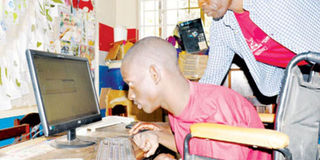Low vision candidates excell in UCE, says UNEB

A child with special needs learns computer in Kampala. PHOTO | FILE.
The 2023 Uganda Certificate of Education (UCE) examination results have shown that candidates with Special Needs Education, especially those with low vision performed well.
While presenting the results on Thursday, Uganda National Examination Board (UNEB) executive director, Mr Dan Odongo said they registered a total of 809 Special Needs Education (SNE) candidates of whom 368 were males and 441 females who registered for the 2023 UCE examination compared to 721 in 2022.
According to him, this is an increase of 12.2 percent over the last one year. These consisted of the blind (35) of whom 5 passed in division one, representing 14.3 percent; five in division two, representing 14.3 percent; 10 passed in division three, representing 28.6 percent, 13 passed in division four, representing 37.1 percent; two were graded in division nine.
Those with low vision were 183, among whom 53 passed in division one which is 29.0 percent , 40 in division two representing 21.9 percent 41 in division three representing 22.4 percent, 44 in division four representing 24.0 percent 5 in division nine resenting 2.7 percent.
Mr Odongo said candidates with low vision were given question papers with enlarged print to enable them to read them more easily.
“All these candidates were allowed extra 45 minutes in each paper,” he said.
Mr Odongo said three of the 71 deaf candidates passed in division one, representing 4.2 percent; three in division two representing, 4.2 percent; six passed in division three representing 8.5 percent; 41 in division four, representing 57.7 percent and 18 in division nine, representing 25.4 percent.
The results showed that 10 of the 79 physically handicapped candidates passed in division one (12.7 percent), 15 in division two (19 percent), 19 in division three (24.1 percent) 32 in division four (40.5 percent) three in division nine (3.8 percent).
According to the board, there were 351 other candidates with other forms of disability that only needed to be given extra time. Only 12 (1.5 percent) candidates were absent.
Mr Odongo explained that the board made adequate arrangements for these candidates, which included modification of questions, provisions of questions written in braille forms, providing support personnel for handicapped and dyslexics, and sign language interpreters for the deaf.




